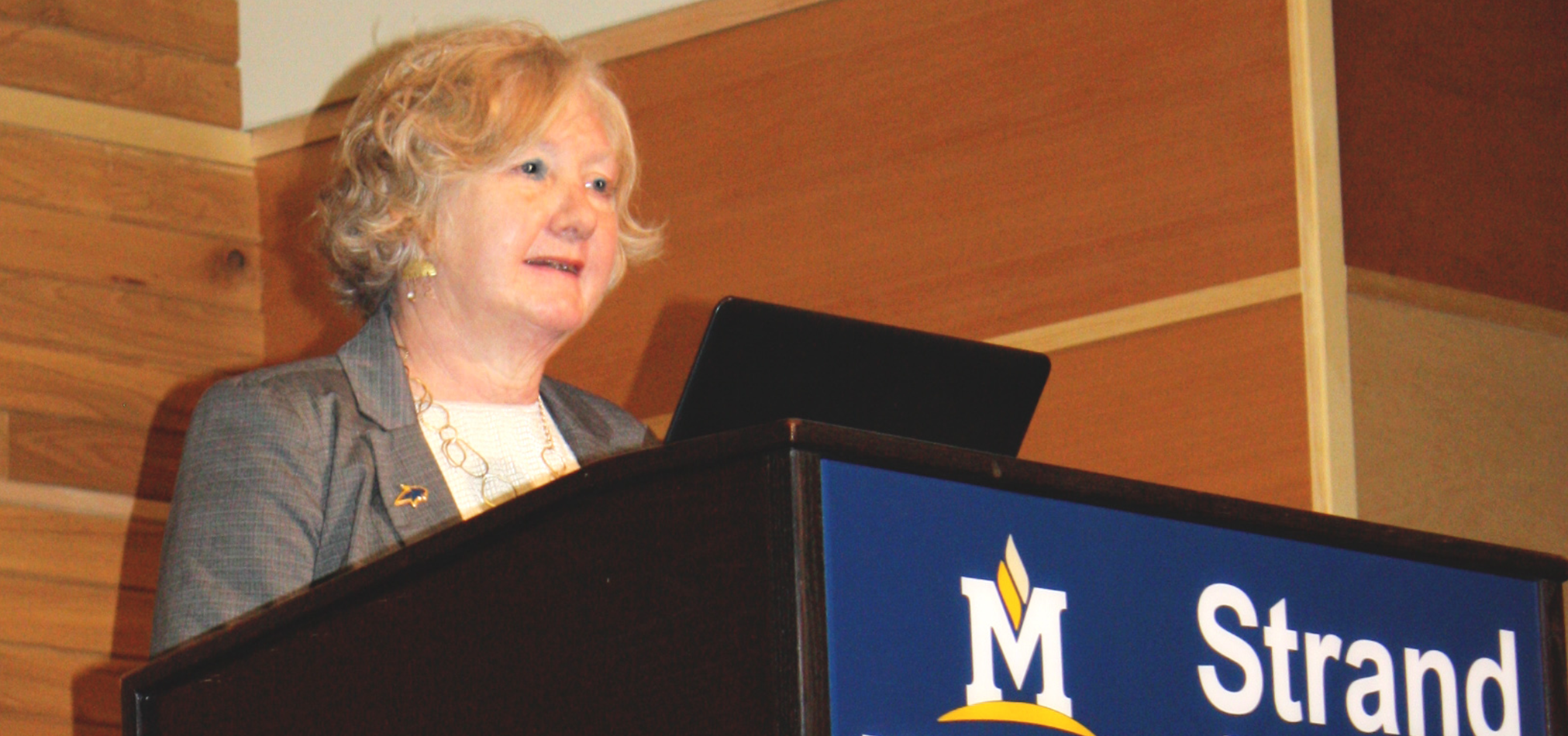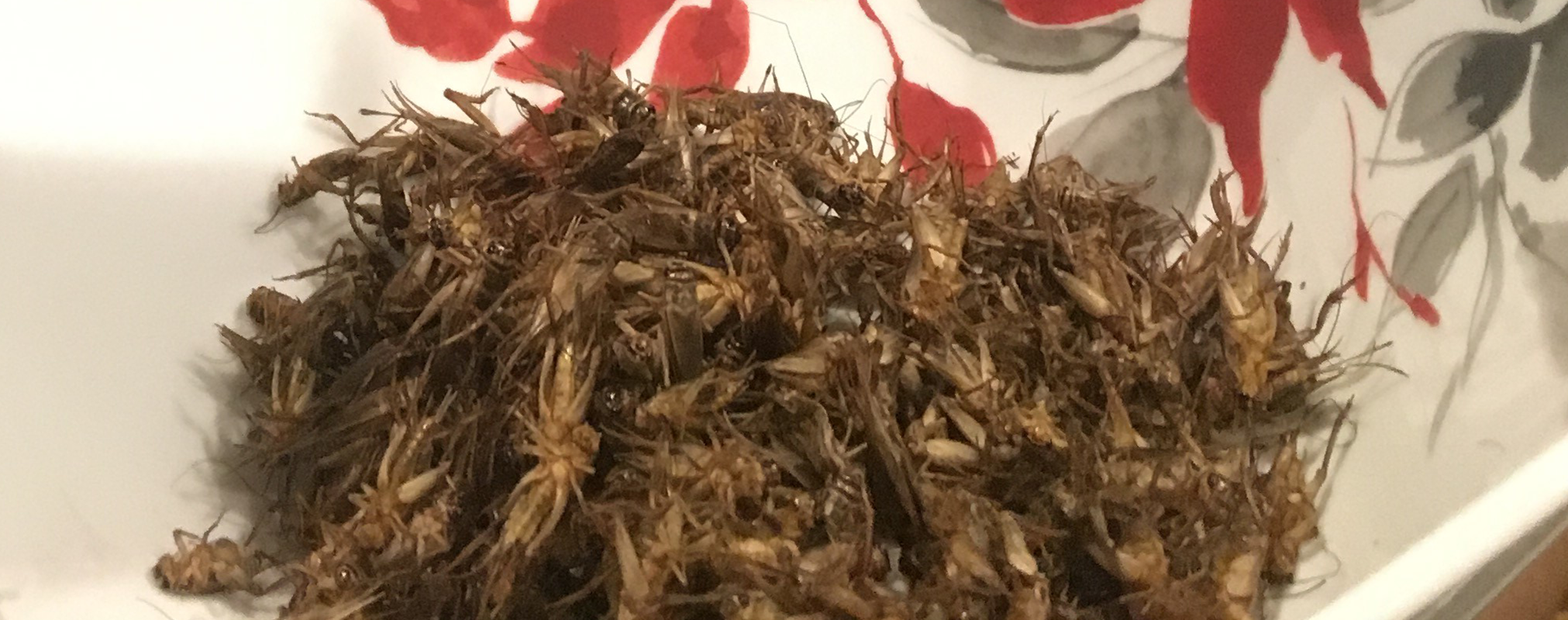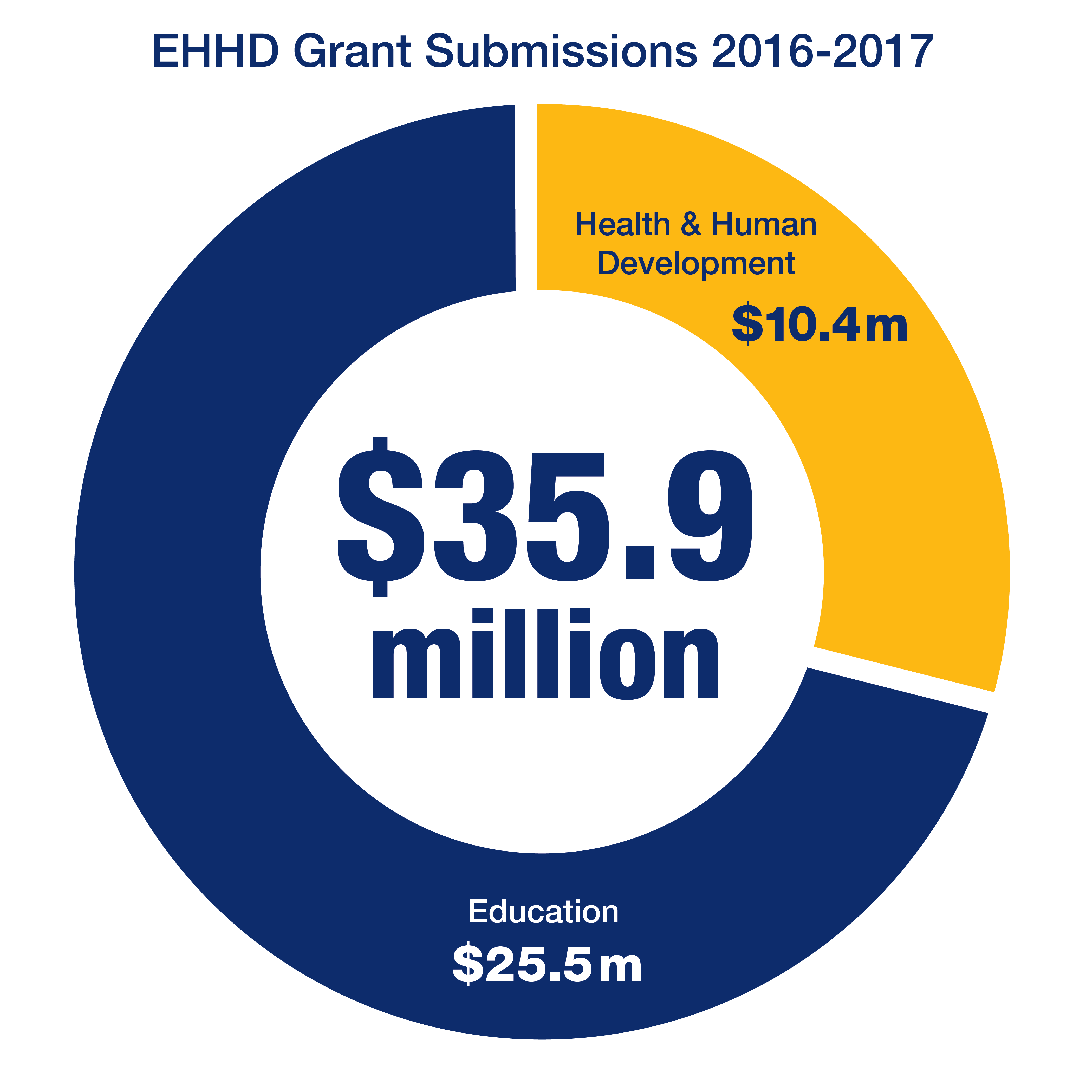Research and Discovery
Highlights beyond the classroom 2016–2017


HHD professor part of One Medicine grant
Nutrition and exercise science professor Mary Miles is part of the $1.5 million “One Medicine” grant that is looking into developing new treatments for inflammatory and infectious disorders in humans and animals. Working with Seth Walk, assistant professor in microbiology and immunology, and Carl Yeoman, assistant professor in animal and range sciences, Miles is investigating the influence of gut microbiomes on inflammation in animals and humans.
Testing human subjects, Miles and her lab group, headed by second year graduate students Stephanie Wilson and Jessica Burgess, are measuring a number of inflammation variables, including a high fat meal challenge. Basically, 20 to 30 subjects are fed a high fat meal to see if microbiomes in the gut differ between people with high inflammation and those with lower inflammation. In two test groups, participants are checked at rest before a high fat meal to see if inflammation levels in their blood are low or high. After the meal, the team checks to see if levels have changed. They are finding that in individuals with already high inflammation, the level continues to be high after the meal. In individuals with low inflammation, after a high fat meal, the inflammation increases.
As a follow up, Miles, Walk and Yeoman will conduct an analysis to see how microbiomes from low and high inflammation participants differ. They will also transplant them into germ-free, sterile mice to see if the inflammation transfers with the microbiome.
“If inflammation does transfer,” said Miles, “then we can look at strategies in diet and exercise to lower both inflammation and diseases such as Type 2 diabetes and atherosclerosis that are driven by inflammation.”
One Medicine is one of the Montana Research Initiative grants awarded from $15 million set up by the 2015 Montana legislature to serve as seed money to advance research that contributes to Montana’s economy. MSU received $9 million of the grant funding. The principal investigator for One Medicine is Jovanka Voyich-Kane, associate professor in the Department of Microbiology and Immunology at MSU.
Grant studies feasibility of computerized cognitive behavioral therapy
 Mark Schure, assistant professor in community health, received a $139,101 INBRE grant to study the feasibility of using an interactive computer program to address
mental health issues in rural Montana. Along with co-PI Sandy Bailey, professor in human development and family sciences, Schure received funding for one year to better understand mental health needs and
resources available in rural communities and to discern if an interactive computerized
cognitive behavior therapy program might be a feasible option for persons in such
communities. He is collaborating with MSU’s Center for Mental Health Research and Recovery and with Bill Bryan of One Montana.
Mark Schure, assistant professor in community health, received a $139,101 INBRE grant to study the feasibility of using an interactive computer program to address
mental health issues in rural Montana. Along with co-PI Sandy Bailey, professor in human development and family sciences, Schure received funding for one year to better understand mental health needs and
resources available in rural communities and to discern if an interactive computerized
cognitive behavior therapy program might be a feasible option for persons in such
communities. He is collaborating with MSU’s Center for Mental Health Research and Recovery and with Bill Bryan of One Montana.
Working with MSU county Extension agents and other community members to recruit participants, the team has been conducting focus groups throughout many of Montana’s small communities.
“We’re trying to see what the mental health needs in rural communities are and if a computerized mental health program will be accepted,” said Schure. “We also want to find out how people talk about mental health. A lot of people just don’t talk about it because of its stigmatization.”
Schure is demonstrating a new computerized cognitive behavior therapy program called Thrive, developed by Dr. John Greist and under propriety of Waypoint Health Innovations. The company’s website states that Thrive “is an online program for depression that distills best practices from cognitive behavior therapy (CBT) and delivers them through a rich, structured and guided digital curriculum.”
During the focus groups, Schure and his colleagues demonstrate the components of the program and collect feedback on people’s impressions, to see how it might be tailored to rural Montana and promoted to the community, and how to recruit participants for part two of the study. Schure said the computerized program is tailored for all adults and can give people tools for life, not just those with depression.
“The program can teach people how to improve communication, develop more realistic thought processes and introduce hobbies and activities to improve well-being,” he said.
Some of the issues the program faces are areas of Montana without broad band, stigmatization, and lack of computer skills in older adults. The team hopes to pilot the Thrive program this year with the goal of analyzing the effectiveness of the program. The overall aim of cognitive behavior therapy is to help people “act and think the way they want to feel.”


MSU researcher studies effects of weather variability and market dynamics on maple syrup production
A Montana State University assistant professor of sustainable food systems who has conducted research all over the world is turning her attention to maple syrup.
Some farmers in the United States and Canada have noticed that the quantity and quality of their maple syrup is changing with climate variability, said Selena Ahmed from MSU's Department of Health and Human Development in the College of Education, Health and Human Development. Ahmed is co-leading a team of researchers who are investigating these observations.
According to Ahmed, some producers say they are seeing less light-colored syrups historically classified as “fancy grade” and more dark and amber syrups during warm years. At the same time, producers are beginning to tap their maple trees earlier in the year because of sap flow triggered by winter thaw, but also experiencing an earlier end to the maple tapping season with a warming spring. Cold nights and warm days trigger sap flow, and too much warmth brings an end to the season with budding maple trees that make for more unpalatable maple syrup. As a result, Ahmed said, some producers fear that they will ultimately lose money because lighter syrups – that were once considered the highest grades – used to be in the most demand with the best prices. With shifts in composition, the amount of sap required to make maple syrup is also shifting. Maple syrup is an industry worth millions of dollars, Ahmed noted.
Sap’s sugar content determines the quantity of syrup that can be produced from a given amount of sap, Ahmed said, while secondary metabolite defense compounds contribute to the flavor, nutritional profile and health attributes of the syrup. Secondary metabolite compounds are recognized to play a defense role in plants and increase with environmental stress including increased pests and more extreme weather. However, she said the relationship of these factors to environmental variability is poorly known.
Read more about the study.


Education researcher wins grant to study preparing engineers to serve as leaders
Two Montana State University researchers have received a nearly $300,000 grant to study how educators can better encourage and prepare engineering students to serve as leaders.
Bill Schell, assistant professor in the Department of Mechanical and Industrial Engineering in MSU’s College of Engineering, and Bryce Hughes, assistant teaching professor in the Department of Education in MSU’s College of Education, Health and Human Development, were awarded the funding by the National Science Foundation in February.
“It’s important for engineers to identify themselves as leaders and seek leadership roles because they’re uniquely qualified to solve some of the biggest challenges facing society,” such as developing sustainable energy systems and mapping the human brain, Schell said.
According to Schell, engineering education has traditionally emphasized technical skills over the “soft skills” that define effective leadership, such as the ability to harness teamwork and communicate across disciplines. As a result, the team’s earlier work with national surveys of college students suggests that engineering students view themselves as leaders at a significantly lower rate than students in most other disciplines, he said.
“There’s this self-perpetuating stereotype of engineers in cubicles working on problems by themselves,” Schell said. “In the reality of the working world, that’s just not the case. The problems we solve are complex, and require expertise from many areas.”
Schell realized that himself after earning a bachelor’s in industrial and management engineering from MSU in 1997 and then working for several large companies, often in roles where he led projects and teams.
Since returning to MSU in 2010 to teach, Schell has drawn from his experiences in the private sector, and he views the grant award as a significant opportunity to explore ways to best prepare engineers to contribute fully to society.
“We want to know, how do we prepare more engineers who are interested, ready, willing and capable to be the leaders that we need tomorrow?” Schell said.
Read more about the grant.


HHD professor's research centers on mental health education and Montana families
Sandy Bailey, professor and Extension specialist who has 16 years of experience in Extension working with Montana families, said major issues facing Montana communities today are stress, depression and suicide.
“Communities were calling and asking for help, and I found we didn’t have a lot of resources,” said Bailey.
She started working with One Montana, a Bozeman non-profit organization that works with bridging urban and rural communities on various issues, and MSU’s Center for Mental Health Research and Recovery (CMHRR), a center created in 2014 to address the mental health challenges in rural Montana. As a result, Bailey received two grants to provide educational evidence-based programming related to mental health—one from the USDA/NIFA Rural Health and Safety Education and the second from the Montana Mental Health Trust Fund.
Programming intends to help youth learn to cope with challenging life issues and targets youth in grades seven to twelve with a program called Youth Aware of Mental Health (YAM). Seventeen 4-H and FCS Extension county faculty were trained to teach the program across Montana. The program is very interactive and based on role playing situations.
Additionally, Extension county faculty will become certified in Mental Health First Aid and will then teach the eight-hour class in mostly rural communities across the state. This program teaches mental health literacy and prepares individuals to initially handle a mental health crisis and helps them find mental health professionals and resources.
Working with Extension county faculty is vitally important, Bailey said. Even though they are not the mental health content experts, they are the link to help people connect with resources. Extension field faculty can provide support in the area of mental health in three ways – they can link people to mental health resources, they can provide evidence-based educational programming on mental health, and they can help build community capacity to address mental health.

HHD student and husband aim to produce super crickets for heart health
A venture supported by Montana State University’s 406 Labs, Cowboy Cricket Farms, has received a $57,384 grant from the Montana Board of Research and Commercialization Technology, with matching funds from the company.
The grant will be used to develop and test a new proprietary process for selectively breeding a “super cricket” with higher levels of omega-3 fatty acids. The owners of Cowboy Cricket Farms, James and Kathleen Rolin, hope to augment the current fish oil market with a new product that produces higher contents and quality of these fatty acids with less impact on the environment.
According to the Centers for Disease Control and Prevention, heart disease is responsible for 600,000 deaths and costs the U.S. about $207 billion per year. Omega-3 fatty acids are essential for proper brain, heart and body function. Traditionally, consumers have had few options for increasing omega-3 intake, apart from grass-fed meat and oily fish, but according to the federal Food and Drug Administration, some fish can also have high levels of mercury or other contaminants.
"We are a family farm and we care about the health and nutrition of families in an affordable fashion. We think that these ‘super crickets’ are the answer," said James Rolin, who, along with his wife, Kathleen, a disabled Coast Guard veteran and current MSU food and nutrition student, founded Cowboy Cricket Farms in November 2016.
As Montana’s first and only cricket farm, Cowboy Cricket Farms credits 406 Labs and the Blackstone LaunchPad for helping the business from concept to reality.
“They have given us not just business coaching and advice, but also a sounding board,” James Rolin said. “We can bring ideas to them and they will give us honest feedback in a confidential and professional environment.”
The Blackstone LaunchPad at MSU, housed under the Jake Jabs College of Business and Entrepreneurship, is an entrepreneur resource for students, alumni and faculty across the university and community that offers coaching, ideation and venture creation support.
“Without their support we never would have won the awards that we did, never would have had the gumption to go after government grants, never would have made some of the contacts that have made such a huge difference in our business,” Kathleen Rolin said.
“We owe a lot to the excellent group at Blackstone LaunchPad and are happy to have them on our side,” she added.
For more information about this venture, see https://cowboycrickets.com

